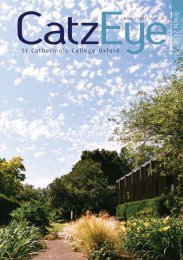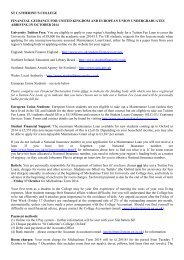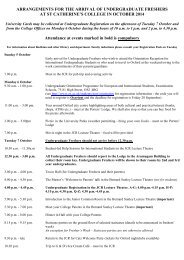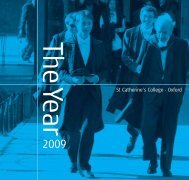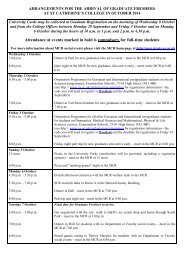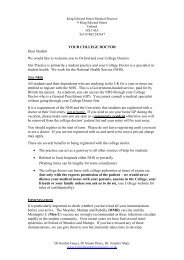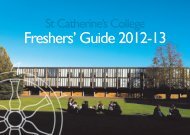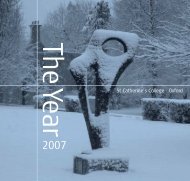Download PDF - St. Catherine's College - University of Oxford
Download PDF - St. Catherine's College - University of Oxford
Download PDF - St. Catherine's College - University of Oxford
You also want an ePaper? Increase the reach of your titles
YUMPU automatically turns print PDFs into web optimized ePapers that Google loves.
CATZ RESEARCH<br />
Shakespeare’s position as<br />
a company shareholder,<br />
theatre owner, and<br />
playwright had a powerful<br />
and changing effect on the<br />
style <strong>of</strong> his work<br />
company had a kind <strong>of</strong> ‘war’ with them, in<br />
which the company eventually triumphed.<br />
The final part <strong>of</strong> Shakespeare in Company<br />
addresses the conditions that helped produce<br />
the playwright’s well-attested ‘late style’<br />
after 1608. Bart explores the reasons for<br />
Shakespeare’s return to his early practice <strong>of</strong><br />
co-authorship in this period and his special<br />
closeness to the poet John Fletcher in his<br />
final years. After the lease <strong>of</strong> the Blackfriars<br />
playhouse, the book argues, Shakespeare<br />
slowly became part <strong>of</strong> the company <strong>of</strong> poets<br />
once again.<br />
One <strong>of</strong> the things that is new about this<br />
study is the unprecedented detail it provides<br />
on Shakespeare’s day-to-day working<br />
practice. The actors with whom he worked<br />
are described through their personal<br />
acquaintances, known roles, and acting<br />
styles. Some, such as Robert Armin and<br />
William Kemp, published compositions <strong>of</strong><br />
their own. Individual chapters address the<br />
way that Shakespeare changed his work to<br />
accommodate the leading players, notably<br />
Richard Burbage (who also had the largest<br />
financial stake in the company). A very clear<br />
adaptation occurred when Shakespeare’s<br />
company changed its lead comic actor.<br />
Rumbustious clowns such as Dogberry in<br />
Much Ado About Nothing (written for William<br />
Kemp) provide a marked contrast to the<br />
satirical fools written for Kemp’s successor,<br />
Armin (roles including Touchstone, Feste, and<br />
the Fool in King Lear).<br />
The character <strong>of</strong> Shakespeare’s actors is one<br />
key factor that the new book considers, but<br />
it is also concerned with the wider culture <strong>of</strong><br />
the Early Modern theatre world. The cover<br />
<strong>of</strong> the book thus features Shakespeare<br />
flanked on the one hand by Richard Burbage<br />
and on the other by Christopher Marlowe:<br />
it was the special balance between these<br />
two kinds <strong>of</strong> influence that made the<br />
playwright’s position such a powerful one.<br />
Shakespeare in Company thus shows that<br />
the national poet was unique not only in his<br />
literary achievements but also in his material<br />
situation. Shakespeare’s unprecedented<br />
position as a company shareholder, theatre<br />
owner, and playwright had a powerful and<br />
continually changing effect on the style <strong>of</strong> his<br />
work. Ultimately, Bart van Es’s book concerns<br />
the creative outcome <strong>of</strong> fellowship. n<br />
ST CATHERINE’S COLLEGE 2012/53



